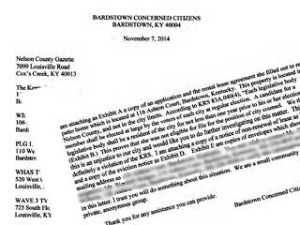Group: Councilwoman-elect Copeland failed to meet residency requirement
By JIM BROOKS
Nelson County Gazette / WBRT Radio
Friday, Nov. 14, 2014, 1 a.m. — An anonymous group of individuals have presented local media and the state attorney general’s office with information it says supports its claim that councilwoman-elect Kecia Copeland was ineligible to run for a seat on the  Bardstown City Council because she was not a city resident when she filed for office.
Bardstown City Council because she was not a city resident when she filed for office.
To be eligible to run for a city council seat, state laws states “a candidate for a legislative body shall be a resident of the city for not less than one (1) year prior to his or her election.”
Copeland’s eligibility is being questioned by a group called “Bardstown Concerned Citizens.”
The cover letter of the 15-page packet is addressed to the Kentucky Ethics Board, the Kentucky Attorney General, and six media organizations, several of whom report they did not receive the documents by postal mail.
The content of the letter alleges Copeland was living in a home in the Maywood subdivision and was not a resident of Bardstown when she filed to be a candidate on July 29, 2014. On her candidate petition, Copeland listed her address as 601 West Stephen Foster Ave.
The letter to the media includes names and phone numbers of Ashton Court residents who can confirm the letter’s assertion that Copeland was a resident there.
DOCUMENTS OFFERED AS PROOF. The 15-page packet of documents includes:
— Copeland’s June 6, 2013, application to lease a patio home at 116 Ashton Court in the Maywood subdivision. The application states Copeland’s previous address was a home in the Copperfield subdivision;
— The 12-month lease Copeland signed on June 8, 2013, for the Ashton Court residence;
— a June 5, 2014, notice to Copeland from the landlords advising her that the lease on the Ashton Court home would not be renewed;
— an Aug. 13, 2014, past-due rent notice regarding the rent on the Ashton Court residence;
— photocopies of three pieces of mail addressed to either Copeland or the cleaning company she owned, Peachy Clean Cleaning Services, LLC, in care of the Ashton Court address. The pieces all carry August 2014 postmarks.
The city’s ordinances state that a member of the city council must be a minimum of 18 years of age, be a qualified voter in the city and live in the city limits during his or her term of office.
CHANGING THE OUTCOME OF AN ELECTION. Questions about Copeland’s residency have been circulating since before the November election. An official challenge of Copeland’s eligibility would have to come in the form of a petition filed by an individual or group of individuals in Nelson Circuit Court seeking to have her declared ineligible to take office due to failing to meet the residency requirement.
However, such a challenge may be an uphill climb — courts prefer to address eligibility questions prior to an election and are hesitant to consider them afterwards.
In a recent Florida case, the state’s appeals court ruled that questions of a candidate’s eligibility should have been raised by the opponent prior to the election.
In its decision, the appeals court found “[g]enerally, courts have no inherent power to determine election contests nor do courts have jurisdiction to inquire into a person’s qualification to run for office after that person has been duly elected.”
If a court accepts a petition to consider Copeland’s eligibility, the the Election Law Manual published by the College of William and Mary School of Law and the National Center for State Courts says such a challenge becomes a question of domicile.
Domicile is defined as the combination of maintaining a residence with the intent of remaining there. Individuals may have more than one residence, but only one domicile at a time.
When a candidate’s domicile is disputed, the courts can examine a number of factors, including the candidate’s division of time between two or more residences; the candidate’s actions in each location; and whether the candidate demonstrates an intention to return to the original domicile.
“No single factor is conclusive,” the manual states, “but if the prospective candidate lives and votes in the same location, that location is presumed to be his domicile. If the candidate lives apart from her family, then the domicile inquiry focuses on the candidate’s claimed residence and not where the candidate’s family lives.”
The manual adds that residency “must be proven by clear and convincing evidence because filing a false candidacy certification may subject the candidate to criminal penalties.”
-30-






